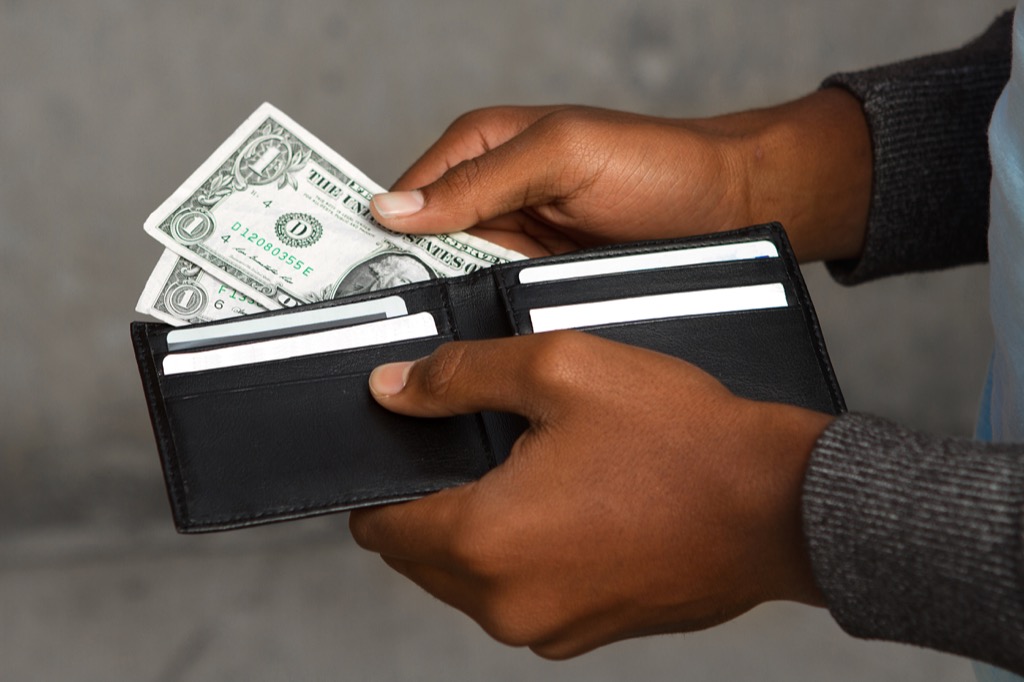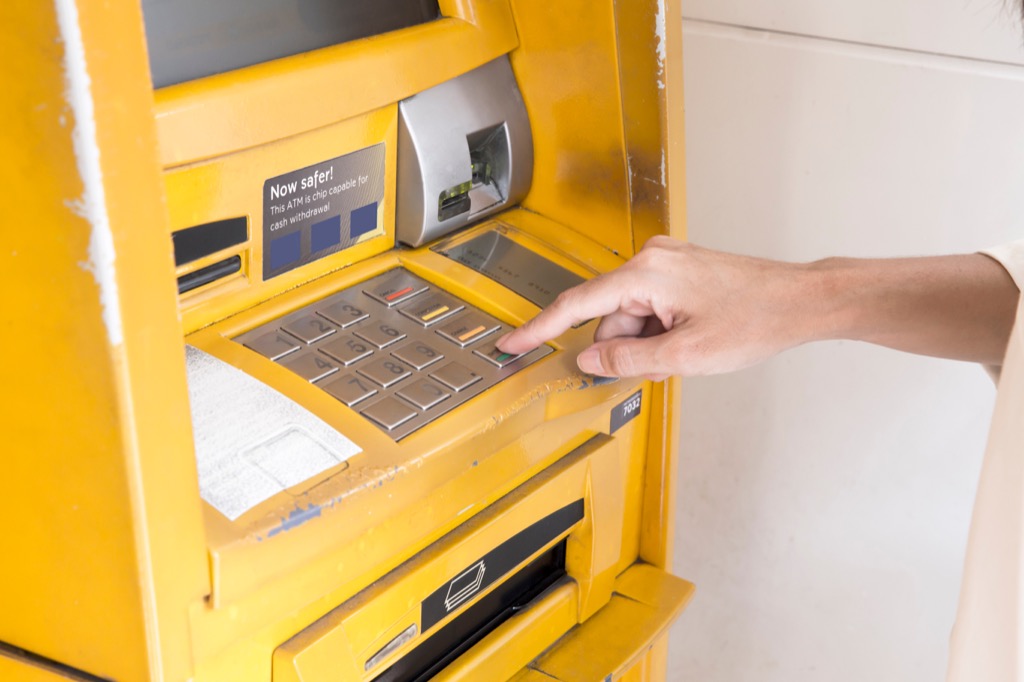40 Scams People Over 40 Should Stop Falling For

With age comes wisdom. Well, in most cases. Of course, there’s an exception to the rule: scams.
When it comes to scams—particularly those based online, where a person who grew up in an era before the internet might be more gullible than their younger and savvier counterparts—people over 40 just can’t seem to stop falling prey. Apparently, the promise of wealth, romance, or free Springsteen tickets is too enticing to allow for lucid thought. (Insidious “fishing” threats of lawsuits and audits are quite effective, too.) A few careless clicks later, and bam! You’re out some serious cash.
The good news is that protecting yourself is no tall order. If you know what, exactly, to look out for, you can safeguard yourself against even the worst hoodwinking attempts out there. Here, we’ve rounded up the common rackets and insidious shakedowns grifters tend to deploy with startling frequency. And, for good measure, we’ve included a few fringe scams, too—because, apparently, you never know what might pop up in your inbox.
1
The Nigerian Prince

It’s the most basic scam in the book. And the email sure sounds so credible: a prince from Nigeria (or the Ivory Coast, or Spain, or Togo, et cetera) is writing to inform you he has come into an inheritance but has to leave the country. He needs to store the money in an offshore account, and has somehow decided you would be the perfect person to assist. He promises to share the vast riches with you—if you just help pay for the taxes, legal fees, and other expenses to clear the way for the deposit. Of course, there’s no fortune—beyond what the scammer lifts from your bank account.
2
Classic Phishing Scam

These scams still catch even the most skeptical person. An email comes from your bank or legitimate-seeming source, such as Amazon or eBay, letting you know there is an issue with your account and you need to click a link to update some information—or “your account will be suspended.” You follow the instructions and either unintentionally download malware onto your computer or provide a scammer with your personal account details.
3
The Perfect Girlfriend

Out of the blue, you get a message through a dating site or Facebook from an account with a really cute profile pic. Even more exciting: she’s very into you, telling you about how funny and interesting you seem and that she’d love to get to know you more—maybe even meet in person. The only catch: She needs money to cover the airfare to come and see you. If your heart and hormones overwhelm your head, you might end up sending the money before realizing that cute picture is actually a stock photo and there is no surprise romance a short flight away.
4
SMiShing Scam

These scams are pretty much identical to phishing ones, but arrive via SMS (or text) message, urging you to either click a link to update your information or call a number to take care of the problem—when in fact you will be providing a scammer with sensitive information.
5
Credit Card Pre-Approval

You may have less-than-impressive credit, so getting a notice that you’ve been pre-approved for a fancy credit card gets you pretty excited. The only catch is that you have to pay the annual fee up front. Needless to say, if you pay the fee, you’re never going to see that credit card.
6
“Work From Home” Mailed Check

Those popup ads promising that you can make $2,000 a week working from your living room seem like the ideal solution to someone eager for a change or a low-key living. Unfortunately, it is not only probably overselling the opportunity, it might end up costing you money.
After clicking through and applying for the job you may get a response, then a check for a few hundred dollars from the “employer”—before you’ve even begun working. The “employer” will then reach out and tell you they made a mistake in sending it to you and if you could just wire the money from your bank account. The check will bounce and you’ll be out the money.
7
“Work From Home” Upfront Fees

A variation on the “work from home” ripoff is one in which the fake employer will charge you an “activation fee” to get started, maybe to cover “training” or some other vaguely defined expenses. It might seem like a worthwhile investment to pave the way for those thousands of dollars you will soon be making—until the new employer vanishes, along with your activation fee.
8
Overpaying Craigslist Scam

You’re selling a bike on Craigslist and you get a message offering to not only buy it, but to pay beyond your asking price. The only catch: the buyer is in a foreign country and wants you to send it through their shipping company. To make this a win-win, the buyer sends a check for $2,000 (even though you only asked for $900) for it but with the caveat that you immediately wire $600 to their shipping company to cover the cost of the send. The check arrives as promised and you follow the steps, only to find out the $2,000 check is a forgery and you’re out $600.
9
All-Expenses Paid Vacation

Who doesn’t love a vacation? It’s no wonder that plenty of people, especially those over 40, get excited when they receive an email or phone call informing you that you’ve won an all-expenses-paid vacation to the Caribbean, Europe, or some exotic destination. As you’re getting your suitcase out and packing up swim trunks and sunblock, the kind person who informed you about the win will let you know they just need your credit card information to hold the reservation. If you do, don’t expect to hear from them again (or expect to get that free vacation).
10
You’ve Won the Sweepstakes!

Another “advance-fee scam” classic is the alert that you’ve won a sweepstakes or, incredulously, the lottery. The fact that you don’t remember entering any contest should probably be the first red flag. The second is that they are asking you to send a few hundred dollars to their organization to cover the processing fees and taxes as they send you a far bigger check. You might almost believe it’s real when an actual check arrives in the mail. But it turns out that check is bogus—the one you sent them was the only real one.
11
The Bill Gates Scam

Similar to the sweepstakes scam, this one tells you that you’ve been selected by none other than Bill Gates himself to receive $5 million as part of “a charity project to improve the 10 lucky individuals all over the world.” You just need to send a few hundred dollars to help facilitate the delivery of the payout. (That said, if you really think Bill Gates would be dedicating his foundation’s money and energy to sending millions to random people, maybe you deserve to lose a few hundred bucks.)
12
Infection Detected

Whoever created this one has a pretty good sense of humor, using your own worries about protecting yourself from scams and viruses in order to inflict scams and viruses on you. It works this way: A pop-up add with scary-looking graphics (a bright-red exclamation mark, or big red X) appears and alerts you that your computer might be infected with a virus. You’re told you can scan and clear your system of infections by clicking a link and paying $50. If you follow through with this, not only will you be out your $50, your computer will now be carrying new malware and other unpleasantness.
13
Discount Concert Tickets

While many might consider Ticketmaster’s “service fees” to be a pretty egregious scam, this one involves an email or ad alerting you to significantly discounted tickets to a hot concert or play. It’s not totally free, so it seems like it might be legit, especially after you enter your credit card information and the tickets come through…until you get to the show and are turned away by security for having bogus tickets.
14
Counterfeit Tickets

A similar scam is when hard-to-get tickets appear on Craigslist or a less-reputable resale site for much more than you’d rather pay—especially since the show is sold out. But you swallow your concerns and pull out your credit card, and don’t realize the tickets are counterfeit until you arrive at the theater.
15
IRS Calling

Let the IRS itself explain how this one works: “Con artists make unsolicited calls claiming to be IRS officials. They demand that the victim pay a bogus tax bill. They convince the victim to send cash, usually through a wire transfer or a prepaid debit card or gift card.” The organization reminds Americans that it will never “threaten to immediately bring in local police or other law-enforcement groups to have the taxpayer arrested for not paying; demand that taxes be paid without giving taxpayers the opportunity to question or appeal the amount owed; ask for credit or debit card numbers over the phone; [or] call you about an unexpected refund.”
16
“See Who’s Viewed Your Profile”

This type of “clickjacking” promises to show you who has been checking out your profile—whether on dating sites, Facebook, or a professional network—but when you click through, it takes you to some survey or a request for personal information, leading your info to be compromised or malware to be installed on your computer. While some platforms do offer this peek into who is checking you out, you should only click through when you are actually on the site.
17
Free Gift Cards

Free gift cards for Starbucks, Target, or similar stores have become a popular way to incentivize consumers to make a purchase, but they’re also more popular than ever with scammers. An offer of a free gift card is often all it takes to get you to enter personal information and succumb to a phishing scam.
18
The Mover Up-Charge

Moving homes is a stressful time in the best of circumstances, so when a moving company promises to take care of your furniture for what seems like a reasonable price, giving you a quote over the phone, you can be forgiven for jumping on the opportunity. Then you may not hear another word about the cost until your furniture has been loaded and moved and suddenly the price has ballooned to twice the estimate or more. When pressed, the company will have plenty of reasons at the ready—the extra chairs you forgot to mention, the extra-large wardrobe—and you’ll have few options but to pay.
19
The Vanishing Movers

A less common but more devastating scam is for a mover, perhaps found through Craigslist or a random flyer, to load up your furniture in their truck, then disappear with it altogether. Whatever your needs, check BBB.org to be sure the moving company is reputable, has a good track record, and—this is most important—actually exists.
20
The Broken Bottle Scam

This is one you’re more likely to encounter in a big city where pedestrians jockey for space on the sidewalk. You bump into someone who drops their bag, breaking the bottle of fine whisky or other valuable liquor (or perhaps a fine vase or other breakable item). They furiously blame you and demand you cover the $80 or so that it cost. You might get them down to $20 and give them the bill just to keep them from causing a scene before you both go on your way—and the guy you bumped into quickly bumps into someone else and goes through the routine all over again.
21
“Payment Requested”

It’s easy to lose track of all the bills and fees we’re paying on a weekly basis, so when you get a notice in the mail telling you there is an outstanding charge for a cable bill or some online purchase that will go to a collection agency unless you send a check or credit card payment, you might believe it—and will be throwing money away in the process.
22
Too-Good-to-Be-True Rental

If you’re looking for an apartment to rent and come across a crazy good deal in a nice neighborhood, you are going to want to jump on the opportunity. But if you’re doing your search through Craigslist or a less-than-trustworthy platform, you might want to think twice before providing your personal information and a security deposit before you’ve even seen the place. There’s a decent chance if the price is too good to be true, it is—the house may not actually be for rent or the person you’re communicating with is not a real-estate agent, but a scammer.
23
Facebook “Dislike”

For those who feel things are a bit too positive in their social media world (ha), an ad offering to enable a “dislike” button on Facebook might seem like an attractive option. Of course, Facebook doesn’t offer a dislike button and clicking through may end up exposing your personal information or installing malware on your computer.
24
Fake Celebrity News

A shocking headline about a famous singer or movie star is often all it takes for you to click a pop-up ad. The link then takes you not to the surprising (and fake) news about your favorite celebrity being in a car accident or getting arrested but to an unintentional malware download that could cause major problems.
25
Charity Chicanery

Some of the most effective and enduring scams are those that prey not on your greed, but on your desire to do good. Following a major disaster or tragedy, it’s not unusual to receive emails or messages suggesting you can help by making a donation through a seemingly legitimate charity. Your intentions may be good, but you should be smart enough to know it’s better to go directly to the site of the American Red Cross or another real charity than trust the exhortation of a random emailer.
26
The Scandalous Photo

A Facebook message from a high-school acquaintance might pique your curiosity, especially when they say something like, “Oh man, I can’t believe this photo of you!” In a moment of naiveté, you might consider he’s got an old photo of you from years ago or of a mutual friend. But clicking on it doesn’t show you any of that, instead it takes you to a sketchy-looking file-sharing website and brings some nasty malware onto your computer.
27
Account Cancellation Notice

An email telling you that your credit card or banking account has been cancelled can be alarming, so when you get the notice, it’s understandable you would be concerned enough to follow the instructions and click through to your account, entering your password and user name. But what you won’t realize until later is that you entered your info on a convincing phishing site and a scammer now has your account information and login info.
28
“Confirm Your Email Account”

You get a request to confirm your account from a bank or other seemingly reputable company, but as you click through and enter your information, you are merely confirming that you’re gullible to a convincing scam.
29
Stranger Friend Request

You may be a friendly person, and a request from a stranger who has zero friends in common with you might just seem like an opportunity to make a new friend. But accepting this stranger’s request can expose your personal information to whoever is actually on the other side of the profile—birthdays, parents’ names, pets names, and other data that might help them crack into your accounts.
30
Duplicate Friend Request

You may get a request from a person with whom you thought you were already friends, but accept their request anyway. Similar to the stranger request, this is likely a scammer who duplicated the profile of someone you know to gather private information about their connections or send out malicious links.
31
Strange Request from a Friend

Some of the most effective scams come from a person you actually know, perhaps writing to ask for help pay to pay medical bills or urging you to click a link. If you don’t know that friend well enough to realize they aren’t actually undergoing medical treatments, you probably should not be sending them any money.
32
Mugged on Vacation

Maybe the most common of these suspicious requests from a friend is the “mugged on vacation” scam, in which a friend emails or messages you out of the blue to tell you they’ve been mugged and had all their belongings taken, including their cell phone and credit card. They are reaching out to try and get help to pay their expenses to get back home—and promise to pay you back immediately as soon as they do.
33
Job Scams

This one goes after people who have posted their resumes on a job site, with the target receiving an offer with a falsified company logo, offering a pretty good gig in a foreign country. But to move things along, you just have to—you guessed it—send money (this time to cover the cost of paperwork or the cost of getting a work permit). If you’re desperate enough for a job, you just might fall for it.
34
Caller ID Scam

A call comes in from an unknown number and the person on the other end tells you he is with the local police department and needs to verify your information to rule you out as a suspect. To confirm this is real, you might enter the number on your caller ID into Google and find it’s legitimate—but in fact, caller IDs are relatively easy for scammers to spoof. Before you give up your personal information, ask that you call them at the number.
35
One-Ring Scam

A call comes in from a mysterious number, rings once, and then stops. Your curiosity gets the best of you and you call the number back. What you won’t realize until later is that you were automatically charged for a service you didn’t ask for.
36
“Look at This Resume”

An official-looking email comes from an unfamiliar name but with an attachment and request that sounds like it could be related to something you’d forgotten. “Here’s that presentation.” “Look at this résumé.” “Invoice attached.” Before you stop to wonder why you were sent this, you’ve clicked the attachment and exposed your computer—and perhaps your whole company’s system—to malware.
37
The Kidnapping Scam

Similar to “mugged overseas” scams, this one comes from someone you know telling you that they (or a family member of theirs) have been kidnapped and are being held for ransom, asking that you wire money immediately to facilitate their release. While this might ignite your Liam Neeson fantasies, don’t try to play terrorist negotiator. Instead, try to contact your friend through another means and you’ll likely find they are home and safe.
38
Court Notice

An email from a law first telling you to appear in court is likely to get your attention, and when it includes a link to what it claims is your court notice, chances are good that you’re going to click on it to see what they’re talking about—and infect your computer in the process.
39
Fake Tech Support Calls

The phone rings at your office and the person on the other end claims to be from Microsoft and is investigating a malware attack. They sound official and ask to access your desktop. Once they’re in, they can install ransomware and lock you out, extorting you or your company to pay a hefty fee in order to get your files back.
40
Free Stuff

This one preys on our undying love of free stuff. It might promise a free pizza or tickets to a show, just asking you to click a link to claim your freebies. In this age of ubiquitous online promotions and special offers, it’s easy to believe these might be legit, until you click the link and the only freebie you get is a computer virus.